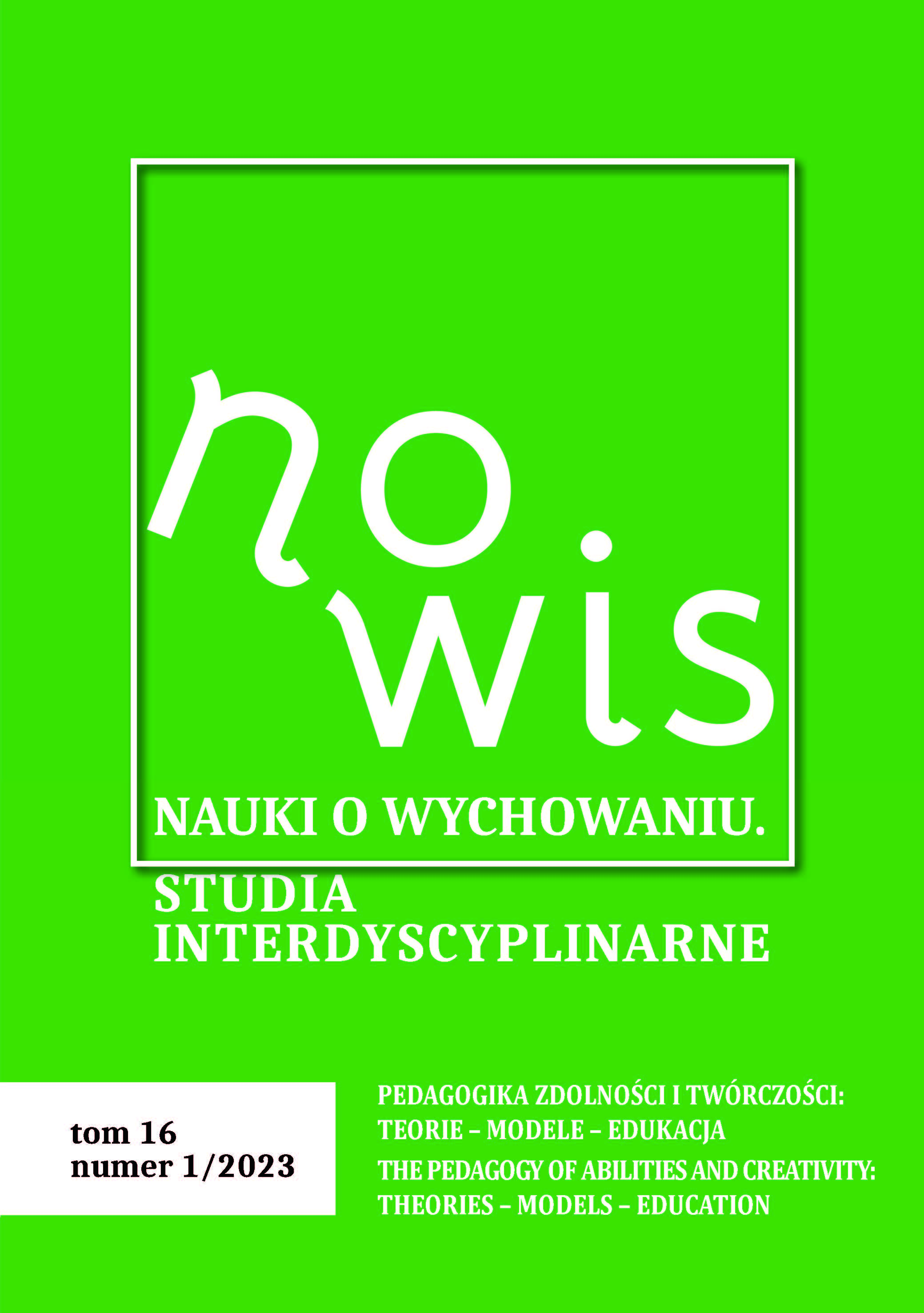Zaangażowanie rodziców w rozwój zdolności dziecka w rodzinach edukacji domowej w Polsce
DOI:
https://doi.org/10.18778/2450-4491.16.12Słowa kluczowe:
edukacja domowa, zdolności, rodzice, dziecko zdolneAbstrakt
Zdolności dziecka i niesprzyjające ich rozwojowi warunki szkolne, które obserwują rodzice, są jednym z istotnych motywów podejmowania edukacji domowej. W tym trybie edukacji to rodzice odpowiedzialni są za umożliwienie dziecku rozwoju adekwatnego do jego możliwości. Celem artykułu było opisanie zaangażowania rodziców w rozwijanie zdolności dziecka w edukacji domowej. Badania przeprowadzone zostały w tradycji jakościowej, metodą wywiadu narracyjnego. Uzyskany materiał badawczy poddano analizie i interpretacji. Wykorzystano Model Różnicujący Zdolności i Talent Françoys Gagnégo. Przeprowadzone badania pozwoliły opisać i zinterpretować aktywność rodziców w obszarze rozwijania zdolności dziecka (skategoryzować i opisać działania, które podejmują, rodzaje zdolności, które identyfikują i pomagają dziecku rozwijać), oraz przedstawić refleksje towarzyszące rodzicom w realizacji tych zadań. Można wnioskować, że rodzice w edukacji domowej koncentrują się w swoich działaniach na stworzeniu dzieciom warunków do rozwoju zdolności oraz wyposażeniu ich w kompetencje, które temu sprzyjają.
Bibliografia
Adamski F. (2002) Rodzina – wymiar społeczno-kulturowy, Kraków, Wydawnictwo Petrus.
Google Scholar
Bielecka-Prus J., Heleniak A. (2018) Motywy podjęcia edukacji domowej w opinii rodziców w: Rodzina w edukacji domowej, J. Bielecka-Prus (red.), Warszawa, Wydawnictwo i Księgarnia Gotów, s. 139–166.
Google Scholar
Dewey J. (2006) Szkoła i dziecko, tłum. H. Błeszyńska, Warszawa, Wydawnictwo Akademickie „Żak”.
Google Scholar
Gagné F. (2016) Od genów do talentu: z perspektywy modeli DMGT/CMTD, tłum. A. Szewczuk, „Psychologia Wychowawcza”, nr 51(9), s. 121–140, https://doi.org/10.5604/00332860.1211501 [online:] https://e-psychologiawychowawcza.pl/resources/html/article/details?id=139299 (dostęp: 12.05.2023).
Google Scholar
DOI: https://doi.org/10.5604/00332860.1211501
Giercarz-Borkowska M. (2019) Edukacja domowa jako alternatywa edukacyjna dla dzieci zdolnych, Wrocław, Wydawnictwo TeksTy.
Google Scholar
Giercarz-Borkowska M. (2020) Między pracą zawodową a edukacją dzieci – sytuacja zawodowa rodziców edukujących domowo, „Edukacja Dorosłych”, nr 1, s. 83–97, https://doi.org/10.12775/ED.2020.006
Google Scholar
DOI: https://doi.org/10.12775/ED.2020.006
Giercarz-Borkowska M. (2021) Wartość edukacji domowej w rozwijaniu zdolności dziecka w: Edukacja dziecka szansą na budowę kapitału społecznego, M. Adamowicz, L. Kataryńczuk-Mania, M. Nyczaj-Drąg (red.), Toruń, Wydawnictwo Adam Marszałek, s. 154–164.
Google Scholar
Kochan K. (2015) Women-Home Educators, „Pedagogika Rodziny”, nr 5(2), s. 157–172, https://doi.org/10.1515/fampe-2015-0026
Google Scholar
DOI: https://doi.org/10.1515/fampe-2015-0026
Królikiewicz R. (2016) Socjalizacja w edukacji domowej w opinii rodziców edukujących domowo, „Edukacja Elementarna w Teorii i Praktyce”, nr 4(42), s. 115–128.
Google Scholar
Limont W. (2012) Uczeń zdolny. Jak go rozpoznać i jak z nim pracować, Sopot, Gdańskie Wydawnictwo Psychologiczne.
Google Scholar
Porzucek-Miśkiewicz M. (2013) Samopoczucie ucznia zdolnego w szkole w: Środowisko edukacyjne uczniów zdolnych, M. Jabłonowska (red.), Warszawa, Wydawnictwo Universitas Rediviva, s. 219–224.
Google Scholar
Rimm S. (2000) Dlaczego zdolne dzieci nie radzą sobie w szkole, tłum. M. Horzowska, Poznań, Wydawnictwo Moderski i Spółka.
Google Scholar
Salcher A. (2009) Utalentowany uczeń i jego wrogowie, Rzeszów, Wydawnictwo Oświatowe FOSZE.
Google Scholar
Sękowski A. E. (2000) Osiągnięcia uczniów zdolnych, Lublin, Towarzystwo Naukowe KUL.
Google Scholar
Ustawa z dnia 14 grudnia 2016 roku prawo oświatowe, Dz.U. 2017 poz. 59 ze zm.
Google Scholar
Kopeć M. (2020) Odpowiedź na interpelację nr 2849 w sprawie finansowania edukacji domowej, https://www.sejm.gov.pl/Sejm9.nsf/InterpelacjaTresc.xsp?key=BN79VL&view=5 (dostęp: 30.03.2020).
Google Scholar






 Strona czasopisma, prowadzona przez Zespół redakcyjny NOWiS na platformie Index Copernicus:
Strona czasopisma, prowadzona przez Zespół redakcyjny NOWiS na platformie Index Copernicus: 





